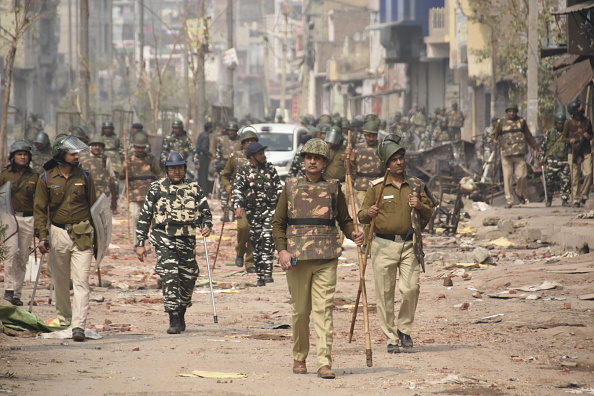
Security members take measures following the Citizenship Amendment Act (CAA) clashes in Mustafabad, Delhi Photo: Getty
A bench headed by Justice Siddharth Mridul said that certain statements in the speech were “offence per se” and gave an impression that only one institution fought for the independence of the country.
The court granted three days to the Delhi Police, represented by special public prosecutor Amit Prasad, to file its short reply to the bail application filed in the case under the stringent UAPA and listed the case for further hearing on April 27.
Referring to Khalid’s remarks that ‘Jab aapke purvaj dalali kar rahe the’ (When your ancestors were brokering), the court said “This is obnoxious. These expressions being used, don’t you think they incite people?”
“There are no qualms against free speech but what are you saying,” observed the court.
“This is offensive per se. You said it at least five times…Don’t you think it foments religious ferment between groups? Did Gandhi Ji ever employ this language ? Did Bhagat Singh employ this language against the English? Is this what Gandhi ji taught us that we can use such intemperate language against people and their ‘purvaj’?” questioned the court.
The court asked if free speech can extend to “obnoxious statements” and if the speech did not attract the law against promoting enmity between religious groups.
“Can free speech extend to making these obnoxious statements? Does it not attract sections 153 A and section 153 B (of IPC)? Prima facie this is not acceptable,” it said.
“It is very easy to invoke Bhagat Singh but difficult to emulate him… There was a gentleman who was eventually hanged …. He stayed there…, he did not run away. You are saying you weren’t even there,” stated the court.
Senior advocate Trideep Pais, appearing for the petitioner, said the Amravati speech was made in the context of protests against the Citizenship Amendment Act (CAA) and the violence at Jamia Milia Islamia.
He also said that speech did not have any “reaction” and did not incite violence.
The senior lawyer sought bail on grounds that Khalid was not present when the violence broke out, no money was recovered from him and the case is based on cooked up statements.
The court stated that for the offence of conspiracy, the accused need not be present at the place of the offence.
The senior lawyer informed the court that the present FIR was “premised” on certain portions of the speech.
“We are not surprised”, said the court.
Khalid and several others have been booked under the anti-terror law in the case for being the “masterminds” of the February 2020 riots, which had left 53 people dead and over 700 injured.
The violence had erupted during the protests against the CAA and the National Register of Citizens.
On March 24, the trial court had denied bail to Khalid, saying there were reasonable grounds to believe that the accusations against him were prima facie true.
The trial court had noted from the charge sheet that there was a premeditated conspiracy of a disruptive ‘chakka jam’ and a preplanned protest at 23 different sites which was to escalate to confrontational ‘chakka jam’ and incitement to violence and resulting in riots.
Besides Khalid, activist Khalid Saifi, JNU students Natasha Narwal and Devangana Kalita, Jamia Coordination Committee members Safoora Zargar, former AAP councillor Tahir Hussain and several others have also been booked under the stringent law in the case.
For more stories that cover the ongoings of Delhi NCR, follow us on:
Instagram: https://www.instagram.com/thepatriot_in/
Twitter: https://twitter.com/Patriot_Delhi
Facebook: https://www.facebook.com/Thepatriotnewsindia
Two youth arrested for killing a 55-year-old woman during a robbery in Jyoti Nagar; stolen…
Scheme aims to provide affordable meals to over 1 lakh people daily, with each canteen…
Featuring works by Krishen Khanna and Prabhakar Kolte, the exhibition explores Indian modernism through figurative…
Police are probing the stabbing death of a 36-year-old man found near Sanjay Lake in…
Court says custodial interrogation is necessary and warns contractors may influence witnesses or tamper with…
Hiral Singhal’s solo exhibition featuring 15 intuitive abstract paintings is on view at Osho Dham…